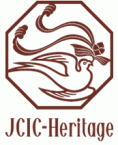
Mission of JCIC-Heritage: To promote international cooperation for the protection of cultural heritage abroad
Cultural heritage is a testament to humanity's long history. We are responsible for passing on cultural heritage to future generations as an asset shared by all people.
Due to conflicts, natural disasters, environmental degradation, and changes in social structure that destroy cultural heritage, many treasures are in danger of not being passed on to future generations. This would be a great loss to all humanity.
In June 2006, Japan enacted the Law on the Promotion of International Cooperation for Protection of Cultural Heritage Abroad. Japan is expected to contribute to the advancement of diverse cultures throughout the world by further promoting international cooperation.
We established the Japan Consortium for International Cooperation in Cultural Heritage in June 2006, with the aim of creating a common base for coordinated and collaborative international cooperation. The Consortium brings together a wide variety of institutions and individuals who share a common desire to conserve cultural heritage. In this way, we hope to help sustain and develop international cooperation to aid the conservation of cultural heritage.
Activities
1. Network Building
In Japan, a wide variety of consortium members, including research institutions, administrative agencies, and private-sector corporations, are involved in international cooperation. We promote relations among the groups by conducting workshops and seminars, or using an interactive website. These enable our experiences/expertise to be shared, contributing to better coordination of international efforts.
2. Information Sharing
We expedite the collection and exchange of information concerning international cooperation and provide a database of heritage preservation projects undertaken by Japanese organizations, both private and governmental.
3. Research
We conduct research on other countries’ international cooperation strategies. Using our findings, we act as the advisory body for Japan’s preservation projects. Recently, we responded to Mongolia’s and Federated States of Micronesia’s request for assistance in preservation. Moreover, in order to identify potential areas in need of Japanese assistance or cooperation in Bhutan and Armenia, we collected the information on the present situation as well as current problems with the existing conservation efforts. In addition, we studied other countries’ international efforts towards the recovery of disaster-affected cultural heritage.
4. Public Advocacy
We publish and disseminate information on international cooperation activities in cultural heritage. We also have a website, and publish cultural heritage preservation projects online. Trough symposia, we share up-to-date information and discuss the importance of international cooperation.
The operation system
Various agencies and organizations cooperate with each other to support the conservation of cultural heritage. They are called upon to collaborate with the aim of energizing international cooperation related to the preservation of cultural heritage. The consortium holds meetings targeting overseas regions respectively, and shares the most recent research on international cooperation for cultural heritage.
JCIC-Heritage holds symposium for public to advocate activities for the fight against illicit traffic in cultural goods. We also share information of activities for the fight against illicit traffic in cultural goods among the researchers and governmental organizations.
The Japan Consortium for International Cooperation in Cultural Heritage hosts a symposium each year for the general public. This year, the symposium was held at Heiseikan of the Tokyo National Museum on December 1, 2012. The symposium was entitled “Wandering Cultural Heritage: 10 Years of the Convention on the Means of Prohibiting and Preventing the Illicit Import, Export and Transfer of Ownership of Cultural Property” (sponsor: Japan Consortium for International Cooperation in Cultural Heritage, Agency for Cultural Affairs, Japan).
This year marks the 10-year anniversary of Japan’s ratification of the Convention on the Means of Prohibiting and Preventing the Illicit Import, Export and Transfer of Ownership of Cultural Property. The symposium introduced Japanese efforts to safeguard cultural properties from illegal exportation and importation pursuant to the Convention and the current state of those efforts, and also described efforts overseas.
A report on Japan’s national efforts was given by SHIOKAWA Tatsuhiro, Director of the Office for International Cooperation on Cultural Properties, Agency for Cultural Affairs while a report on local efforts was given by Superintendent TSUJIMOTO Tadamasa, an officer of the Nara Prefectural Police Department who deals with crimes against cultural properties. Speaking on the current state of trafficking in cultural properties, KURITA Isao, an art dealer and owner of the Gandhara Antiques specialty shop, described the root of the problem of trafficking in cultural properties in countries where those properties are trafficked from. Foreign examples were described by a member of Italy’s Carabinieri (national military police), Massimiliano Quagliarella, Head of Operations, Carabinieri Cultural Heritage Protection. Quagliarella described safeguarding of cultural heritage by the Carabinieri as well as actual cases of art forgery and detection of illegal exports. Active discussions developed after all of the presentations, with panelists joined by IGARASHI Kazushige Deputy Director of the Enforcement Division, Customs and Tariff Bureau, Ministry of Finance.
Although the problem of safeguarding cultural heritage is seldom brought up, this problem is actually a familiar one. Examining this problem, the symposium was well-received by members of the general public who were in attendance. The Japan Consortium for International Cooperation in Cultural Heritage will continue to make opportunities to further understanding for the general public about problems related to cultural heritage.

